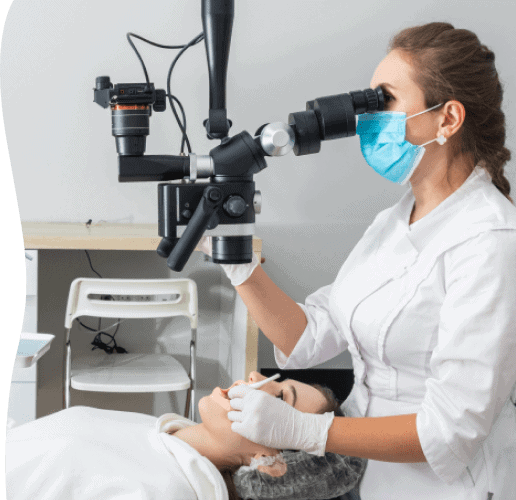Learn More About Gum Disease


Get Relief From Gum Disease and Restore Your Smile With Advanced Dental Services.
Gum or periodontal disease is an infection of the gum tissue that can progress over time when left unaddressed. Gingivitis is the early stage of this dental health issue that can often be managed with good oral hygiene practices and professional cleanings. However, it can lead to periodontitis, characterised by the progressive breakdown of the structures supporting the teeth. This can result in tooth loss and pose a threat to one’s dental health.
If you’re concerned about your gums, we recommend coming in for a consultation at The Smile Space. The dentists will carefully evaluate your condition and provide timely treatment to preserve your smile. We understand how frustrating it can be to deal with gum disease, which is why we will work diligently to deliver excellent oral care to keep your mouth healthy. Our dental team believes that by working together, we can help you achieve your dental goals and improve the health of your gums and teeth. Contact our dental clinic today to learn more about how we can help you with gum disease.
Dental Services that Can Address Gum Disease
Our dental clinic is committed to providing safe and quality treatments for gum disease. Once we have determined a treatment plan for you, we may use one or more of the following dental services to promote the healing of your gums:
Scale and Clean
Scaling reduces the plaque and tartar above and below the gum line. This professional teeth cleaning helps to reduce the number of bacteria in the mouth and may help to improve oral health. Scaling may be used for mild cases of gum disease, and it is a nonsurgical method for addressing the condition.
If you are concerned about whether you have infected gums, talk to one of the dentists at The Smile Space about scale and clean.


Gum Disease Treatment
Treatment for gum disease typically needs a comprehensive approach for the gums to heal. Our clinic’s dental professionals will assess your gums’ condition to provide an efficient treatment plan.
At our dental clinic, we aim to not only remove the plaque causing your gum disease but also improve and preserve your teeth and overall health.
Tooth Extractions
In most cases wherein gum disease has progressed and severely damaged your teeth, the dental professionals in our clinic may perform the necessary removal with the aim of preserving the health of the other teeth and the gums.
The treatment may be essential to managing the infection from spreading. With the use of advanced dental technology, you can experience having healthy gums.


Wisdom Teeth Removal
When wisdom teeth erupt, they can create pockets that trap bacteria and food particles. It may cause the surrounding gum tissue to become irritated, which can eventually lead to an infection.
If this is the case, we may need to recommend wisdom teeth removal to extract the problematic tooth completely. It is a common procedure that may relieve pain and prevent further damage to teeth and gums.
Get Outstanding Dental Care with Us Today
At The Smile Space, we believe that comprehensive dental care should be accessible to everyone. Our experienced team is dedicated to providing the highest standard of care, using the latest technology and techniques. If you're looking for a dentist in Sutherland, book an appointment at The Smile Space today!

Frequently Asked Questions
Gum Disease
What are the signs of gum disease?
Gums that are healthy are firm, pale pink, and should fit snugly around your teeth. However, gums that develop gum disease may experience the following signs and symptoms:
- Dark red gums.
As we’ve mentioned, healthy gums should have a colour of pale pink. Otherwise, it may indicate inflammation or irritation if they look dusty red. - Bad taste in the mouth.
This is one of the symptoms of gum disease due to bacterial infection in the soft tissues of the mouth. - Swollen gums.
You may notice inflammation and enlargement in particular areas of the gums. - Bad breath.
Gum disease is caused by a plaque of hardened tartar between the teeth and gums. Such debris can cause a foul smell coming from the mouth. - Receding gums.
It is when teeth don’t fit compressed along your gumline or look like the gum tissue is pulling away and exposing the tooth roots. - Tender gums.
Gums that are painful to touch or sore. - Bleeding gums.
Your gums easily bleed, especially when you brush or floss your teeth. - Toothache.
You may feel discomfort or pain when chewing due to infected gums.
What causes gum disease?
Dental plaque is a sticky film of harmful bacteria that forms between your teeth and gums when you don’t properly brush. Unfortunately, it can start to harden over time and turn into tartar. Tartar is the calcified deposit that occurs when the plaque buildup is left in your mouth for a long period. These unwanted particles in your mouth can irritate your gum tissue and, later on, progress to the early form of gum disease, or gingivitis.
Poor dental hygiene is one of the culprits of having infected gums. At the same time, other people suffer from this oral health issue due to erupting wisdom teeth, or risk factors of genetics, and certain medical conditions. Having a dry mouth also increases your risk for gingivitis.
How long is the treatment period for gum disease?
The severity of your gum disease will generally determine how long it will take for your gums to heal. If you follow your dentist’s advice and prescriptions, you may see improvements within two to four weeks.
However, if you have more severe infected gums, recovery may take a little longer than the average length of treatment time. You can consult the dentist at The Smile Space to know the estimated duration of your treatment period.
What will happen if I don't manage my gum disease?
If you don’t manage your gum disease, there’s a high risk of rapid progression of the bacterial infection, which means they can travel underneath your gum lines and create deep pockets. When this happens, severe periodontitis may develop.
There could be changes in the way your teeth fit together or cause you to have loose teeth, which may eventually cause them to fall out because of severe bone loss. In addition, advanced gum disease may increase your risk of other serious health conditions. Hence, it is essential to keep up your oral hygiene habits and see a dentist regularly to address any signs and symptoms of gum disease as soon as possible before it has a chance to progress.


